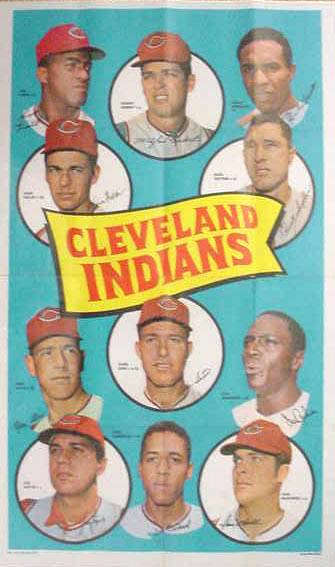1969 Topps TEAM POSTERS #13 Cleveland Indians
Luis Tiant, Sam McDowell, Zoilio Versalles, Alvis, Azcue, Cardenal, Fuller, Lou Johnson, Sonny Siebert, Sims, Snyder.

Please wander around the website for more info, prices, values & images
on vintage baseball, football, basketball, hockey, sport and non-sports cards.
Autographed Gateway Cachets
Gateway Stamp Company has provided collectors well over 1 MILLION
authenticated certified autographs over the last 30 years.
Silk Cachets from Gateway Stamp Company Even though a "stamp company", Gateway rarely dealt in stamps, going down a new and creative road becoming one of the world's most unique secrets in autograph collecting combining the best in art, color photographs, history and autographs with their full-color silk cachet envelopes. Gateway's first client was Cardinals Hall of Famer Lou Brock with hundreds to follow.
WHAT ARE FULL-COLOR SILK CACHETS?
WHY POSTMARKS? |

1962 Topps Baseball Bucks |

1948-1949 Leaf Baseball Cards |

Starting approximately in 1886, sportscards, mostly baseball cards, were often included with tobacco products, for promotional purposes and also because the card reinforced the packaging and protected cigarettes from damage. These sports cards are referred to as tobacco cards in the baseball card hobby. Over the next few years many different companies produced baseball cards. Tobacco cards soon started to disappear as the American Tobacco Company tried to develop a monopoly by buying out other companies.
They were reintroduced in the 1900s, as American Tobacco came under pressure from antitrust action and Turkish competition. The most famous and most expensive, baseball card is the rare T206 Honus Wagner. The card exists in very limited quantities compared to others of its type because Wagner forced the card to be removed from printing. It is widely (and incorrectly) believed that Wagner did so because he refused to promote tobacco, but the true explanation lies in a dispute over compensation.
Soon other companies also began producing baseball and football cards. Sports magazines such as The Sporting News were early entries to the market. Candy manufacturers soon joined the fray and reflected a shift toward a younger target audience for cards. Caramel companies were particularly active and baseball cards were one of the first prizes to be included in Cracker Jacks. World War I soon suppressed baseball card production.



